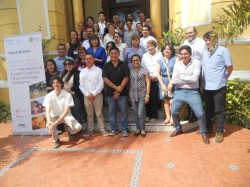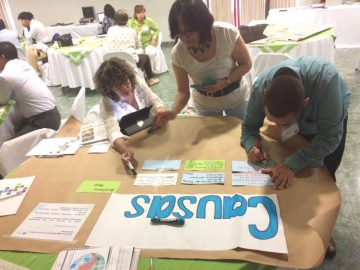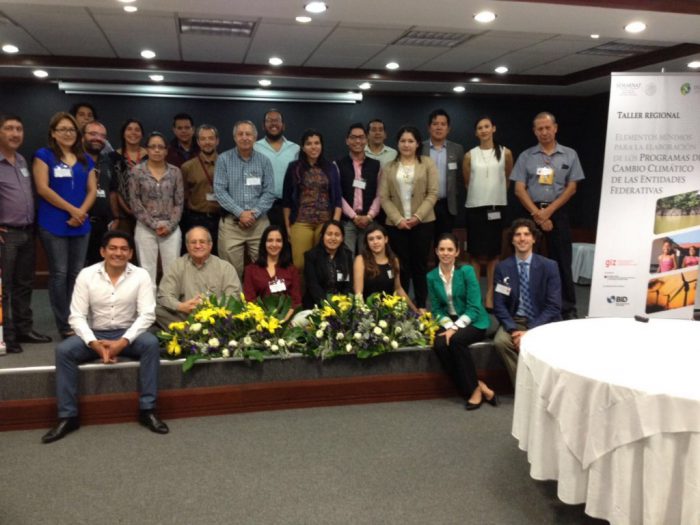With the development of these workshops, work continues on the construction and capacity building at state level in the north and south of the country for the achievement in the construction and implementation of good State Climate Change Programs.
In order to promote the exchange of experiences and the capacity building in the climate agenda, the second and third regional workshops were organized in a series of workshops. The content and importance of how to develop Climate Change Programs at the state level was disclosed according to the minimum elements defined by the federal government.

These elements were prepared by the Secretariat of Environment and Natural Resources (SEMARNAT) in collaboration with the National Institute of Ecology and Climate Change (INECC). The objective was to generate a protocol to promote the development and strengthening of institutional capacities of the states, in order to structure the information contained in the programs to systematize the subnational efforts on climate change.
To achieve greater scope and impact in the states and train a greater number of people in the correct development and implementation of their State Climate Change Programs, the Deutsche Gesellschaft für Internationale Zusammenarbeit (GIZ) GmbH collaborated with SEMARNAT and INECC to carry out a series of regional workshops in the north, center and south of the country.
On March 7th and 8th, the second regional workshop was held in Guadalajara, this workshop covered the northern part of the country. On March 16 and 17, the third and final workshop took place in Mérida, this workshop covered the southern part of the country.
In total, more than 100 people from 22 states participated in the three workshops. Experts from SEMARNAT, INECC and GIZ presented, communicated, and trained the states in the development of the main instruments for climate change policy. It was possible to provide guidance for the elaboration and/or future update of their State Climate Change Programs. In each of the workshops an additional day was dedicated to strengthening knowledge in climate change adaptation.
Some of the topics discussed in which enriching discussions were generated due to the interest shown by the states were:
Development of greenhouse gases and compounds (GHG&C) inventories

Having an inventory of GHG&C allows the state to have detailed information on its emissions and their sources, which provides a starting point for measuring the emissions generated and developing actions that encourage reductions. An inventory must be based on five principles: comparability, completeness, consistency, transparency, and precision.
Construction of vulnerability diagnostics
Climate change affects states and their territories, impacting ecosystems and their biodiversity, as well as human communities and their productive activities. Therefore, it is necessary to have tools to quickly and effectively know the vulnerability of states and their regions to climate change, as well as the institutional capacities to respond to this phenomenon. In order to identify adaptation measures to climate change in a particular context, it is necessary to have a previous diagnosis of the vulnerability of the exposed territory or system.
Development of mitigation and adaptation measures, as well as the importance of their prioritization

A good mitigation and adaptation measure must respond to the problems detected and must meet the main needs of reducing GHG&C emissions and reducing the vulnerability of the state and its exposed systems, whether in the physical, social and economic context (human settlements, productive systems, infrastructure) or in the ecological context (ecosystems and biodiversity). Each state is free to develop and prioritize its own measures based on its needs, urgency, budget, or on the benefits obtained, etc.
Need for the creation and implementation of Monitoring, Reporting and Verification (MRV) and Monitoring and Evaluation (M&E) systems
The MRV and M&E systems provide transparency and certainty to the actions, they also guarantee the comparability, consistency, and accuracy of the data.
Having these types of instruments helps to obtain results on the effectiveness of the measures. This allows decision-making regarding budget implementation and improvement of measures.

With this series of regional workshops, the states have been able to approach the federation and know the minimum elements necessary to be able to develop and/or update their State Climate Change Programs. These sectoral climate agendas are a true reflection of the possibilities offered by transversality and inter-institutional work among the state agencies, that have committed themselves to achieving climate change objectives and can contribute to national progress in this area.
It will now be the responsibility of the states to develop their instruments and benefit from the technical support of SEMARNAT and INECC to achieve good programs that respond to the particular realities of each region.
Workshop agendas:
[wpfilebase tag=file id=411 /]
[wpfilebase tag=file id=430 /]
Workshop minutes:
[wpfilebase tag=file id=412 /]
[wpfilebase tag=file id=431 /]
Presentations of the second regional workshop (Jalisco):
[wpfilebase tag=browser id=92 /]
Presentations of the third regional workshop (Yucatán):
[wpfilebase tag=browser id=96 /]
Workshops pictures:
[wpfilebase tag=browser id=105 /]
